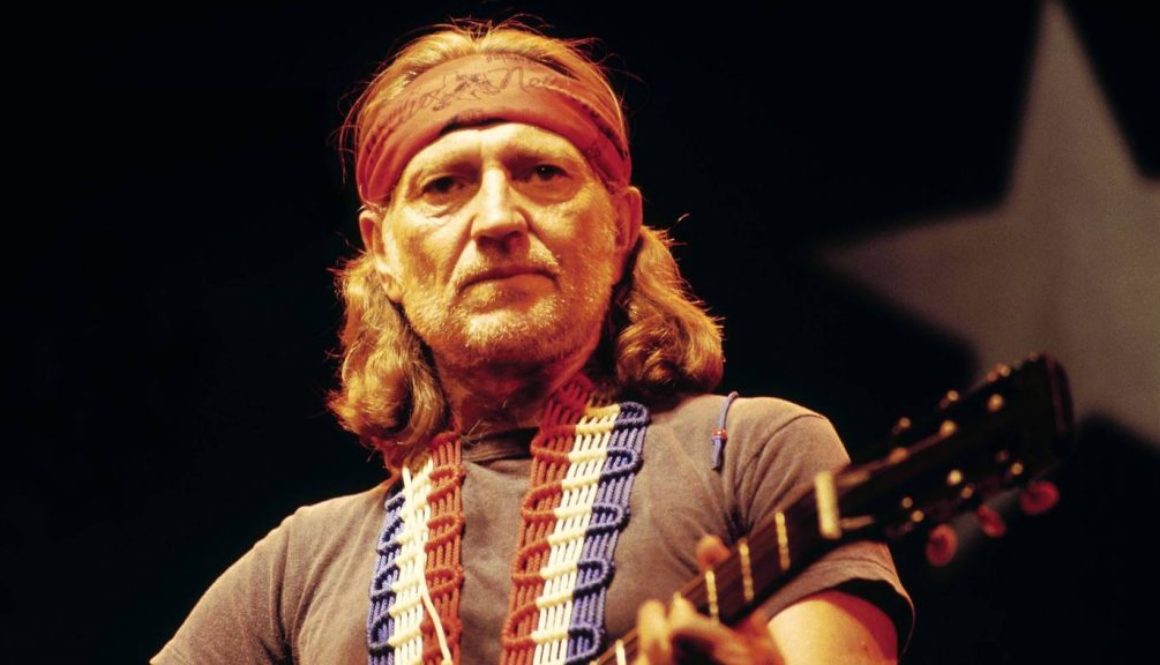Willie Nelson – Music Biography

Grandparents can do wonderful things. William and Nancy Nelson gave their six-year old grandson, Willie Hugh Nelson, music lessons. And Willie Nelson has been making music pretty much ever since. He wrote his first song at seven and played in a local band before he was old enough to go to high school. By the time he’d graduated high school in 1951, he’d worked as a disc jockey for a number of local radio stations and was also singing and performing at bars and wherever he could get a gig.
He left Texas for the Portland, Oregon region in 1956 and recorded a single, “Lumberjack,” that did well locally. He also sold an original song, “Family Bible,” that became a 1960 hit for Claude Gray. Moving to Nashville, Nelson managed to get a songwriting contract but not the recording contract he was longing for. Ray Price covered Nelson’s “Night Life” and got the songwriter to join his touring band as their bassist.
During this time, Nelson’s songs were being recorded by many of Nashville’s stars, like Billy Walker, who hit it big with “Funny How Time Slips Away.” Nelson even made it big on the Christmas scene when Roy Orbison recorded “Pretty Paper,” which is now a holiday standard.
And, of course, there was Patsy Cline and her recording of Nelson’s song, “Crazy,” which not only was a huge hit for her in 1961 (coming immediately after her big score with “I Fall to Pieces”), but is also mentioned by Nelson as being his favorite song (that he wrote) that anyone has anyone had recorded.
But as much as his songs were doing well, Nashville turned out not to be the place for Nelson as a singer and a performer. He recorded a number of albums for RCA in the mid-to-late 1960s and he did manage to get on the charts from time to time, but nothing truly big.
At one point in 1969 he busted one of his guitars – a classical with a special built-in stereo pickup that Baldwin had made for him – and he sent it to Nashville to get it repaired. When informed the Baldwin was too badly damaged to be repaired, he asked what comparably guitar might be in stock and could they put the Baldwin pickup in that guitar and send it back to him? What came was a Martin N20 Classical, which he liked so much that he’s kept it to this very day. And anyone who’s seen pictures of Nelson with “Trigger” (named after Roy Rogers’ horse) can certainly attest that the guitar has been played incessantly. Trigger also bears close to, if not more than, one hundred signatures of Nelson’s friends and musicians he’s worked with.
Nelson left Nashville for Austin, Texas in the early 1970s. He signed with Atlantic Records and recorded two albums that got good reviews but mediocre sales. He switched labels again, and his first album for Columbia, Red Headed Stranger, became a huge hit, both critically and commercially. And it also netted Nelson his first Number One single, “Blue Eyes Crying in the Rain.”
The late 1970s saw Nelson at his most successful. In 1976, he teamed up with Waylon Jennings, Tompall Glaser and Jessi Colter to record Wanted! The Outlaws, which would become country music’s first platinum album. He followed that up in 1978 by releasing not one, but two albums that would go platinum: another collaboration with Jennings called Willie and Waylon, and Stardust, an album of pop and jazz standards such as “Moonlight in Vermont” and “All of Me.” In a somewhat ironic twist, this album that focused on Nelson as singer, not as songwriter, turned out to be one of his biggest hits.
Nelson continued recording throughout the 1980s, both on his own, notching hits like “On the Road Again,” as well as in collaborations with others, whether they be other country legends like Merle Haggard (“Pancho and Lefty”) or vocal stars like Julio Iglesias (“To All the Girls I’ve Loved Before”). He teamed up with Waylon Jennings again, and with Johnny Cash and Kris Kristofferson, the four became The Highwaymen and had an incredibly successful album and world tour.
He also became very involved in in charitable causes, getting together with Neil Young and John Mellencamp to organize the first Farm Aid concert, held in Champaign, Illinois in 1985.
Throughout the 1990s and 2000s, Nelson has prolifically recorded and performed, working with artists as diverse as Bob Dylan, Sinead O’Connor, Kid Rock, Al Green, Keith Richards, Rickie Lee Jones, Wynton Marsalis, and even with reggae artist Mishka just this past year, 2010.
There are a lot of names into that old guitar. And the music lessons that his grandparents gave him certainly went a long, long way!
Peace

Nilo Veloso, Jr.
March 18th, 2015 @ 2:51 am
I am an avid fan of Willie Nelson. His musical skills both in writing and performing portray the innate stroke of genius in him. His songs will be treasured in the hearts of those who loved country music……